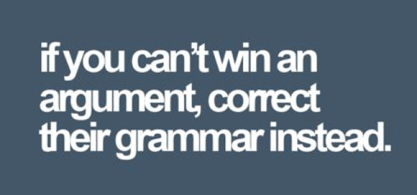Some time ago, James Taylor’s article: ‘Why I wish I was a non-native English speaker teacher’ raised quite a bit of a stir because of its content and thought-provoking title. Interestingly, one native speaker insisted in his comments that the title should have been ‘Why I wish I WERE’. I wish I was is wrong, uncultivated and déclassé, he explained. Despite the fact that according to Swan’s English Language Usage, the Ngram Viewer (thanks for pointing it out, James Taylor), and to the majority of English speakers it sounds correct, the person was adamant. And furious. They really didn’t like I wish I was. This made me wonder: what is correct English and who says so?
We are very often told that English (and Spanish, Polish, the whole lot) is deteriorating at a break-neck speed. The young corrupt the language by inventing strange words and misusing the existing ones. The non-Native Speakers do so by  misemploying grammar and vocabulary. As in the example above, some of us might indeed have very strong feelings about what is right and wrong language usage. We also tend to believe that there is only one, correct and proper way of using alanguage. For example, take the infamous TESCO sign ‘Less than 10 items’ queue. Or the uneducated use of relative pronouns: “the man who I saw”. Surely, ye’all agree that it should be: fewer than and the man whom I saw. How uncultivated to think otherwise, ain’t it? Worse still are the unruly nouns used as verbs, which negatively impact the language. You and me both know we shouldn’t of say it.
misemploying grammar and vocabulary. As in the example above, some of us might indeed have very strong feelings about what is right and wrong language usage. We also tend to believe that there is only one, correct and proper way of using alanguage. For example, take the infamous TESCO sign ‘Less than 10 items’ queue. Or the uneducated use of relative pronouns: “the man who I saw”. Surely, ye’all agree that it should be: fewer than and the man whom I saw. How uncultivated to think otherwise, ain’t it? Worse still are the unruly nouns used as verbs, which negatively impact the language. You and me both know we shouldn’t of say it.
But who says it is wrong? The native speakers? The linguists? Are there any immutable rules of correct language use? I’d like to argue that our feelings and believes about what constitutes correct grammar and language usage are for the most part arbitrary, biased, illogical and above all – transitory. They are like clothing fashions – what was in twenty years ago, might be completely passé now.
Yet, in the heat of the moment it is easy to forget that any language is a living and evolving creature. A product of hundreds, thousands, millions, and even – in case of English – billions of speakers. It’s also been around for centuries. In that time it has changed completely. And we need to understand that what for us seems good grammar and correct English, might have seemed completely wrong a century or two ago (not to mention Old or Middle English times), and vice versa.
For example, Aunt Betsey from Dickens’ David Copperfield is a matron who speaks in a very educated, schooled and elaborate manner. Yet, she says: he don’t, and it don’t matter. Since Betsey belongs to the upper class, we can safely assume that to say it don’t was perfectly acceptable socially. Otherwise, she would have never said. However, to our ears it clearly sounds wrong. As does: this street is badly lighted, as said by one of the characters in The House of Mirth by Edith Wharton, published only a century ago. It should be lit, shouldn’t it? Well, actually, most of Mirth’s contemporaries would have found lit horribly déclassé. For them it was lighted.
 Literature is full of examples like the two above which show us that what is considered proper English is, and always has been, in a flux. For example, in the nineteenth century, builded and swimmed were the appropriate past forms of build and swim. Were they speaking ‘bad’ English back then? Of course not. Neither do we. For there is no logical reason why built is ‘more correct’ than builded. It’s a product of arbitrary preferences of English speakers. And grammarians also have such preferences.
Literature is full of examples like the two above which show us that what is considered proper English is, and always has been, in a flux. For example, in the nineteenth century, builded and swimmed were the appropriate past forms of build and swim. Were they speaking ‘bad’ English back then? Of course not. Neither do we. For there is no logical reason why built is ‘more correct’ than builded. It’s a product of arbitrary preferences of English speakers. And grammarians also have such preferences.
For example, Fowler in his Dictionary of Modern English Usage does not like the singular they, as in: if a student fails an exam, they can retake it in September. He also objects to aggravate being used in the sense of annoy, which he feels is uneducated. In the same fashion, Strunk and White in The Elements of Style argue that hopefully, as in hopefully, it won’t rain tomorrow, is clearly wrong (despite the fact that supposedly, or certainly in the same example are not). More recently, this point was also brought up by Heffer in this article. He doesn’t like how people misuse hopefully (and a score of other words for that matter). I say he doesn’t like because his arguments (as those used by Fowler and Strunk and White) are completely arbitrary and based on his personal feelings and preferences about language usage.
Nevertheless, we often feel compelled to believe the language experts. After all they should know. What I personally object to, is how they pick and choose on a whim what language usage they like, and then deem it approprate. For example, Heffer and  others think that we – the uneducated – corrupt the correct and proper meaning of words. Strunk and White are appalled by the uncultivated use of the word obnoxious to mean extremely unpleasant or annoying. According to them, we must preserve the original meaning which derives from Latin obnoxiosus, (ob = towards, noxa = harm), that is, exposed to harm. Heffer, among many other usages he personally dislikes, highlights decimate to mean devastate or destroy. Surely, everyone knows that it originated over a thousand years ago as a form of Roman punishment whereby every tenth legionary was killed. Hence, it is absurd to say: the population was decimated by 50 per cent.
others think that we – the uneducated – corrupt the correct and proper meaning of words. Strunk and White are appalled by the uncultivated use of the word obnoxious to mean extremely unpleasant or annoying. According to them, we must preserve the original meaning which derives from Latin obnoxiosus, (ob = towards, noxa = harm), that is, exposed to harm. Heffer, among many other usages he personally dislikes, highlights decimate to mean devastate or destroy. Surely, everyone knows that it originated over a thousand years ago as a form of Roman punishment whereby every tenth legionary was killed. Hence, it is absurd to say: the population was decimated by 50 per cent.
Yet, if we wanted to be consistent, and to follow their logic in all cases, we would not only deprive ourselves of meanings that have become the most familiar and commonly applied, e.g.:
- morbid – from Latin meaning diseased (and not interested in unpleasant subjects)
- fabulous – from Latin meaning legendary or mythical (and not great, brilliant)
- fantastic – from Old French meaning unreal, not from this world, which in itself is a corruption of the original Greek word, which came to French via Latin, phantastikos, from phantazein ‘make visible’, phantazesthai ‘have visions, imagine’, from phantos ‘visible’ (related to phainein ‘to show’)
but we would also end up with some truly bizarre meanings:
- hysteric – from Latin “belonging to the womb”
- bizarre – from Italian via French meaning brave
- peruse – perhaps from Anglo-Norman French peruser to mean use up, wear out
Which “original” meaning should we preserve? Surely, nobody would argue that hysteric means “belonging to the womb”. Yet, we are told, hopefully is not a real word and that obnoxious should mean “exposed to harm”.
Hefferians will also cringe at how some nouns are misused as verbs, for example to impact or to google. Again, this is purely arbitrary and usually concerns words that are new in the lexicon. However, Strunk and White still dislike to chair, or to host. Peculiar, isn’t it? Indeed, because if we followed this logic, saying to copy, to worship or to silence would all be wrong since all of them – and thousands more – were originally nouns.
Even more peculiar is how some will still insist on using whom as the object relative pronoun, as in: the man whom I saw. In this case, according to the pundits, using who or that would be incorrect. As it would also be in: Who did you see yesterday? – a question which to most of us sounds perfectly normal and grammatically sound. Mind you, we also must never end sentences with prepositions, so the man who we talked about goes out of the window. Why?
The issue goes back to Robert Lowth, an eighteenth century author of very influential books on correct language usage. For example, he also argued that: “Whose is by some authors made the possessive case of which, and applied to things as well as persons; I think, improperly.” He went as far as criticising Shakespeare, Milton and Swift for bad grammar.
How dare he!
Yet, his successors still judge and scold us for ‘misusing’ the language. Clearly, though, nobody who wants to have friends will ever say Whom did you see yesterday?, or the man about whom we talked. It makes one think that perhaps some grammarians do not want to have friends after all.
The “Hefferians” seem to forget that all languages change over time. And that change is a highly creative force which can enrich the language, adding new words and meanings. There is absolutely now logical reason to claim that languages deteriorate over time. Nor that they improve in any objective sense of the word. They simply become different. After all, nobody would say that Shakespeare spoke incorrect English. Nor that Chaucer could not spell correctly. Wouldn’t it be more productive then to embrace the changing nature of the language, rather than fear and ridicule these changes?
Further reading and listening:
- Ives-Keeler, K. What is the future of English?
- McWhorter, J. Myths and Half-Truths of Language Usage and Understanding Linguistics: The Science of Language
- Rundell, M. What are the correct rules of English grammar?
References:
- Fowler, H. Dictionary of Modern English Usage
- Strunk, W. and White, E.B. The Elements of Style
- http://www.etymonline.com/
- http://www.oxforddictionaries.com
Reblogged this on Your IELTS Mentor and commented:
a very interesting post.
Thanks for reblogging 🙂
Thank you for this great post! While living in Poland, I have really struggled to get across to Poles and other Slavs that English doesn’t an Akademia Nauk which controls the language and what is ‘correct’ – the users of the language determine that.
I think a lot of people, not just in Poland, have the notion that there must be one, proper and correct way of using a language, and that this way hasn’t changed over the years.
Great post, Marek. I was teaching wishes and regrets yesterday, and I took great pleasure in telling my students that ‘was’ is currently as acceptable as ‘were’ in the structure I used in the title of my post. I couldn’t help but think of the pedant you mention, and I must be honest, it made enjoy the lesson all the more!
Seems like this bears me out too:
https://books.google.com/ngrams/graph?content=I+wish+I+was%2C+I+wish+I+were&year_start=1800&year_end=2000&corpus=15&smoothing=3&share=&direct_url=t1%3B%2CI%20wish%20I%20was%3B%2Cc0%3B.t1%3B%2CI%20wish%20I%20were%3B%2Cc0
Thanks for commenting, James. He was a pedant, wasn’t he? And thought he knew it all too! 😉
Thanks for sending the statistics. It’s very interesting to see that around 1820 and 1860, both ‘I wish I was’ and ‘I wish I were’ were equally popular (just as they are now). Makes you wonder if ‘were’ is going to strike back again – The return of ‘were’!
On a more serious note, it just confirms that what people think and insist is correct is largely a matter of fashion.
I think many of the ‘grammar police’ in our industry (and outside it, frankly) recognise that language changes over time, but perhaps to them, those major shifts occurred at a distance, not possible within their lifetimes. I’ve often had this discussion or ones like it with my mother, my colleagues, and even myself. I’ll likely post about it myself. Thanks for the nudge.
You’re right. It’s difficult sometimes to accept that language changes not only during a given generation, but even as we speak.
Looking forward to the post 🙂 I’ve got a couple more ideas on the topic too, so be on the lookout for more articles like this one soon 🙂
Here she is: http://fourc.ca/correct/
Great post, Tyson. Thanks for sharing it here.
Really interesting read, thanks! With my adult learners, when there are queries over the correct answers in a grammar gap fill or phrases they’ve heard in films, I often find myself telling them about prescriptive and descriptive language. As you say, English is a highly transitory language which is constantly changing (for better or worse) and as teachers, we need to go with the flow.